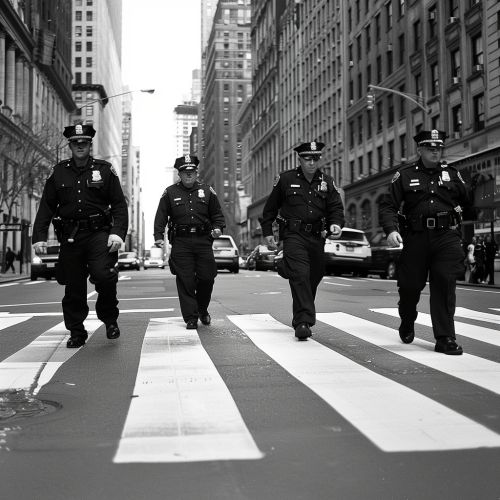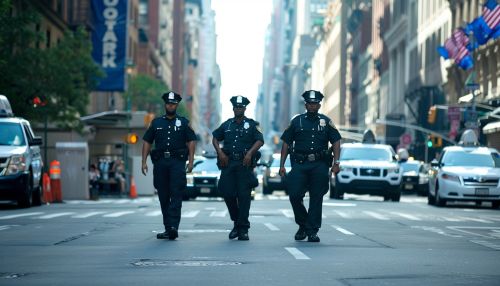The Police: Difference between revisions
(Created page with "== Introduction == The police are a constituted body of persons empowered by a state to enforce the law, ensure public and social order, and prevent crime. Their powers include the legitimized use of force. The term is most commonly associated with police services of a sovereign state that are authorized to exercise the police power of that state within a defined legal or territorial area of responsibility. Police forces are often defined as being separate from the milit...") |
No edit summary |
||
| Line 90: | Line 90: | ||
The police play a vital role in maintaining law and order, protecting citizens, and upholding justice. While the profession faces significant challenges, ongoing reforms and advancements in technology offer opportunities for improvement. Understanding the complexities of policing is essential for informed discussions about its future. | The police play a vital role in maintaining law and order, protecting citizens, and upholding justice. While the profession faces significant challenges, ongoing reforms and advancements in technology offer opportunities for improvement. Understanding the complexities of policing is essential for informed discussions about its future. | ||
[[Image:Detail-93253.jpg|thumb|center|Police officers patrolling a city street.|class=only_on_mobile]] | |||
[[Image:Detail-93254.jpg|thumb|center|Police officers patrolling a city street.|class=only_on_desktop]] | |||
== See Also == | == See Also == | ||
Latest revision as of 05:01, 22 June 2024
Introduction
The police are a constituted body of persons empowered by a state to enforce the law, ensure public and social order, and prevent crime. Their powers include the legitimized use of force. The term is most commonly associated with police services of a sovereign state that are authorized to exercise the police power of that state within a defined legal or territorial area of responsibility. Police forces are often defined as being separate from the military and other organizations involved in the defense of the state against foreign aggressors; however, gendarmerie are military units charged with civil policing.
History
The history of policing can be traced back to ancient civilizations. In ancient Egypt, evidence suggests that police-like functions were performed by officials known as "medjay." The Roman Empire also had a form of policing known as the "Cohortes Urbanae," which were responsible for maintaining public order in Rome.
During the medieval period in Europe, policing was often the responsibility of local lords and their retainers. The concept of a centralized police force began to take shape in the 17th and 18th centuries. The first modern police force is often credited to Sir Robert Peel, who established the Metropolitan Police Service in London in 1829.
Functions and Responsibilities
The primary functions of the police include maintaining public order, enforcing the law, and preventing, detecting, and investigating criminal activities. These functions can be broadly categorized into several areas:
Law Enforcement
Law enforcement involves the application of the law to ensure compliance and to deter criminal activities. This includes patrolling, responding to incidents, and conducting investigations.
Crime Prevention
Crime prevention involves strategies and measures designed to reduce the risk of crimes occurring. This can include community policing, crime prevention through environmental design (CPTED), and public education campaigns.
Public Order Maintenance
Maintaining public order involves managing crowds, preventing riots, and ensuring that public events proceed without incident. This often requires specialized training in crowd control and riot tactics.
Emergency Response
Police are often the first responders to emergencies, including natural disasters, accidents, and medical emergencies. They provide immediate assistance and coordinate with other emergency services.
Traffic Control
Traffic control involves enforcing traffic laws, managing traffic flow, and investigating traffic accidents. This is crucial for ensuring road safety and reducing traffic-related incidents.
Organizational Structure
Police organizations can vary significantly in their structure and hierarchy, but they generally follow a paramilitary model. This includes a clear chain of command, ranks, and specialized units.
Ranks
Common police ranks include officer, sergeant, lieutenant, captain, and chief. Each rank has specific responsibilities and authority levels.
Specialized Units
Specialized units within police forces handle specific types of crimes or situations. These can include:
- **Homicide Units**: Investigate murders and suspicious deaths.
- **Narcotics Units**: Focus on drug-related crimes.
- **SWAT Teams**: Handle high-risk operations, such as hostage situations.
- **Cybercrime Units**: Investigate crimes involving computers and digital technology.
Training and Education
Police officers undergo extensive training and education to prepare them for their duties. This typically includes:
Basic Training
Basic training, often conducted at police academies, covers fundamental skills such as firearms proficiency, self-defense, legal knowledge, and physical fitness.
Specialized Training
Officers may receive additional training for specialized roles, such as detective work, forensic analysis, or crisis negotiation.
Continuing Education
Continuing education is essential for keeping officers updated on new laws, technologies, and policing strategies. This can include workshops, seminars, and advanced courses.
Legal and Ethical Considerations
Police work is governed by a complex framework of laws and ethical guidelines. These are designed to ensure that police actions are lawful, fair, and respectful of individual rights.
Use of Force
The use of force is a critical issue in policing. Officers are trained to use force proportionately and only when necessary. The use of deadly force is subject to strict regulations and oversight.
Accountability
Police accountability mechanisms include internal affairs units, civilian review boards, and independent oversight bodies. These entities investigate allegations of misconduct and ensure transparency.
Human Rights
Respect for human rights is a fundamental principle in policing. This includes the right to due process, freedom from torture, and protection against arbitrary detention.
Technological Advancements
Technology has significantly impacted modern policing. Innovations include:
Forensic Science
Advances in forensic science, such as DNA analysis, have revolutionized crime investigation. Forensic techniques allow for more accurate and reliable evidence collection.
Surveillance
Surveillance technologies, including CCTV, drones, and body-worn cameras, enhance police capabilities in monitoring and recording activities. These tools can deter crime and provide valuable evidence.
Information Systems
Police information systems, such as databases and crime mapping software, facilitate data analysis and information sharing. These systems improve decision-making and resource allocation.
Challenges and Controversies
Policing faces numerous challenges and controversies, including:
Police Brutality
Incidents of police brutality have sparked widespread protests and calls for reform. Addressing this issue requires comprehensive changes in training, oversight, and accountability.
Racial Profiling
Racial profiling involves targeting individuals for suspicion of crime based on their race or ethnicity. This practice is widely criticized for being discriminatory and ineffective.
Community Relations
Building and maintaining positive relationships with communities is essential for effective policing. Community policing initiatives aim to foster trust and cooperation between police and the public.
Conclusion
The police play a vital role in maintaining law and order, protecting citizens, and upholding justice. While the profession faces significant challenges, ongoing reforms and advancements in technology offer opportunities for improvement. Understanding the complexities of policing is essential for informed discussions about its future.


